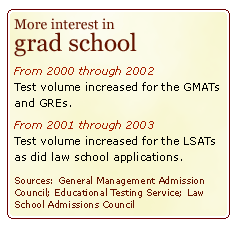NEW YORK (CNN/Money) – Going to grad school may seem like a productive way to wait out an unforgiving job market or to help you secure a better position than the one you've got.

After all, common wisdom holds that those with graduate degrees have greater potential for financial success and job security than those who simply hold a bachelor's degree.
There's plenty of evidence to suggest that that can be true. But the question is: Would it be true for you?
The answer depends on several considerations. Among them: the field you choose, the perceived quality of your program, the opportunity cost for you to attend and the job market for those with your degree.
The money
The Employment Policy Foundation, a nonpartisan research group in Washington, D.C., estimates that the lifetime earnings of a worker with a Ph.D. or professional degree (that is, a law degree, medical degree or M.B.A.) will total $4.4 million.

That certainly trumps the projected $2.4 million EPF estimates workers with a bachelor's degree will make over a lifetime.
Though there's always been a jump in earnings potential, "the earnings premium is getting even larger," said EPF spokesman Mike Chittenden.
But potential and reality can be two very different things. It's hardly a stretch to imagine a surgeon or a corporate lawyer making more than a desk jockey with a B.A., but such projected averages don't necessarily apply to the Ph.D. in humanities who can't find a tenure-track job and instead spends years as an adjunct professor earning a miserly amount per course with no benefits.
If you're only shooting for a master's in liberal arts, the sciences or engineering, meanwhile, the earnings premium over a B.A. isn't that huge -- about $500,000 more over a lifetime, EPF estimates.
Where you get your degree may also influence the premium you're paid. For instance, according to the latest issue of Business 2.0, an M.B.A. from Arizona State or Vanderbilt University might command a base salary of $75,000, or $20,000 less than a Stanford M.B.A can fetch.
The job security
| 
| |

| 
| 
|

|
 Valerie Morris talks about financing options for prospective graduate students. Valerie Morris talks about financing options for prospective graduate students.
|
 Play video
Play video
(Real or Windows Media)
|
| 
|

|
|
Say you live your life according to the averages, and your earnings do far outpace those of your colleagues who only have bachelor's degrees. That may pad your bank account -- but a higher paycheck could make you more vulnerable when the cost cutters come to town.
There are no hard statistics on how many M.B.A.s have gotten pink slips during this latest economic downturn. But there's ample anecdotal evidence to suggest that there are plenty, including those from top-tier schools.
Now, that's no reason not to get a graduate degree. The point is simply that having one isn't a guarantee of job security.
And job security, of course, isn't just about keeping a job. It's also about being able to get one. Before signing up for a program, figure out how much competition you'll have.

There are several hundred M.B.A. programs, but their graduates are not all valued equally by employers. So if you're setting your sights on working for a top investment bank, find out if those banks even shop for new hires at your school.
Consider, too, the supply and demand for labor in your field and check out your program's placement record. At one second-tier business school, the placement rate of newly minted M.B.A.s fell to between 55 percent and 65 percent, down from 85 percent to 90 percent during good times. "It's scary," said its placement director.
But prospects for M.B.A.s are still much brighter than they are for those who hold graduate degrees in other areas. The job market for Ph.D.s in the humanities, for instance, has been particularly dismal, regardless of the economy, said one tenure-track English professor who writes a column for the Chronicle of Higher Education under the pseudonym Thomas Benton.
According to Benton, you should only pursue a Ph.D. in the humanities if you love a subject, wish to pursue it intellectually and don't expect a tenure-track job. That's because there are so few positions available and it's common to see top-flight candidates competing for what otherwise might be considered unprestigious posts.
"The standards for getting an interview are roughly the standards of getting a tenure job 20 years ago," Benton said.
The sacrifice
Another way to assess whether grad school makes sense for you is to assess the opportunity cost of attending.
| RELATED ARTICLES
|

|
|
|
|
For instance, how much debt will you incur, and how many years will it take you to pay that debt based on what you expect to make when you graduate? According to the Collegiate Funding Services, those who complete a graduate or professional program leave school with an average of $23,000 in student loans.
If you're thinking of stepping out of the work force to go to graduate school, you also need to factor in the lost income during that time. What's more, you may forgo potential promotions --which might have put your pay on par with post-grad expectations. Put simply, the older you are the greater the opportunity cost of dumping your job.
Consider, too, where you wish to work. Does it really require a graduate degree? The business-school placement director, who also has a career counseling business, said an M.B.A. is a good move if you want to advance at Fortune 500 companies. Otherwise, he said, it might not be worth your while.
Lastly, don't underestimate the value of your time. Going to graduate school is hard work, but it's worth it if it's work you enjoy and it helps you make a needed transition without digging yourself too deep into debt.
But if you're not sure it will pay off – however you define "pay off" – then those are valuable years you won't get back.

|

